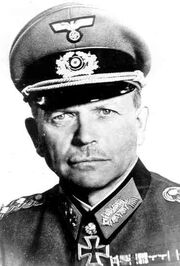TR (Message Wall | contribs) No edit summary |
TR (Message Wall | contribs) |
||
| Line 21: | Line 21: | ||
'''Heinz Guderian''' was [[Germany (The War That Came Early)|German]] general during the [[World War II (The War That Came Early)|Second World War]]. He was renowned as a ''panzer'' commander.<ref>''[[Last Orders]]'', pg. 302.</ref> |
'''Heinz Guderian''' was [[Germany (The War That Came Early)|German]] general during the [[World War II (The War That Came Early)|Second World War]]. He was renowned as a ''panzer'' commander.<ref>''[[Last Orders]]'', pg. 302.</ref> |
||
| − | In March, 1944, [[Adolf Hitler (The War That Came Early)|Adolf Hitler]] declared war on the [[United States (The War That Came Early)|United States]], despite the fact that Germany was already fighting a two-front war. In response, group of military and political leaders, realizing that Germany was doomed to defeat, formed the [[Committee for the Salvation of the German Nation]], and appointed Guderian as its head. The group then assassinated Hitler in [[Münster (The War That Came Early)|Münster]] the following month. |
+ | In March, 1944, [[Adolf Hitler (The War That Came Early)|Adolf Hitler]] declared war on the [[United States (The War That Came Early)|United States]], despite the fact that Germany was already fighting a two-front war. In response, group of military and political leaders, realizing that Germany was doomed to defeat, formed the [[Committee for the Salvation of the German Nation]], and appointed Guderian as its head. The group then assassinated Hitler in [[Münster (The War That Came Early)|Münster]] the following month.<ref>Ibid., pg. 300.</ref> |
[[1944 German Civil War|A civil war]] broke out almost immediately. Several of Hitler's would-be successors were arrested or killed. Ultimately, Guderian and the Committee triumphed.<ref>Ibid., pg. 382.</ref> Ironically, while Germany withdrew from the [[Low Countries (The War That Came Early)|Low Countries]], [[Denmark (The War That Came Early)|Denmark]], [[Norway (The War That Came Early)|Norway]], [[France (The War That Came Early)|France]], and the [[Soviet Union (The War That Came Early)|USSR]], Guderian was able to keep many of the territorial gains Hitler had made early on, including [[Austria#Austria in The War That Came Early|Austria]], the [[Sudetenland (The War That Came Early)|Sudetenland]], and the [[Protectorate of Bohemia and Moravia#Protectorate of Bohemia and Moravia in The War That Came Early|Protectorate of Bohemia and Moravia]].<ref>Ibid., pgs. 318-320.</ref> |
[[1944 German Civil War|A civil war]] broke out almost immediately. Several of Hitler's would-be successors were arrested or killed. Ultimately, Guderian and the Committee triumphed.<ref>Ibid., pg. 382.</ref> Ironically, while Germany withdrew from the [[Low Countries (The War That Came Early)|Low Countries]], [[Denmark (The War That Came Early)|Denmark]], [[Norway (The War That Came Early)|Norway]], [[France (The War That Came Early)|France]], and the [[Soviet Union (The War That Came Early)|USSR]], Guderian was able to keep many of the territorial gains Hitler had made early on, including [[Austria#Austria in The War That Came Early|Austria]], the [[Sudetenland (The War That Came Early)|Sudetenland]], and the [[Protectorate of Bohemia and Moravia#Protectorate of Bohemia and Moravia in The War That Came Early|Protectorate of Bohemia and Moravia]].<ref>Ibid., pgs. 318-320.</ref> |
||
Revision as of 16:13, 21 August 2014
| ||||||||||||||||||||||||||||||||
Heinz Wilhelm Guderian (1888–1954) was a military theorist and innovative General of the German Army. He served during both World War I and World War II. Germany's panzer forces were raised and fought according to his writings. He never became a field marshal, but he is recognized as one of the most prominent generals of the Second World War, playing critical roles in the invasion of Poland in 1939, and in the invasion of the Soviet Union in 1941. He was captured at the end of the war, and held until 1948. He was not charged as a war criminal.
Heinz Guderian in The War That Came Early
Heinz Guderian was German general during the Second World War. He was renowned as a panzer commander.[1]
In March, 1944, Adolf Hitler declared war on the United States, despite the fact that Germany was already fighting a two-front war. In response, group of military and political leaders, realizing that Germany was doomed to defeat, formed the Committee for the Salvation of the German Nation, and appointed Guderian as its head. The group then assassinated Hitler in Münster the following month.[2]
A civil war broke out almost immediately. Several of Hitler's would-be successors were arrested or killed. Ultimately, Guderian and the Committee triumphed.[3] Ironically, while Germany withdrew from the Low Countries, Denmark, Norway, France, and the USSR, Guderian was able to keep many of the territorial gains Hitler had made early on, including Austria, the Sudetenland, and the Protectorate of Bohemia and Moravia.[4]
Heinz Guderian in Southern Victory
Heinz Guderian was an officer in the Imperial German Army in the early twentieth century. During the Great War, he and Austro-Hungarian Major Eduard Dietl served as military observers to the United States for a period in 1916. They observed US Army tactics in the Canadian Rockies, where they met Irving Morrell.[5]
Guderian actually stayed on after Dietl went home, observing Morrell's push on Banff[6] before heading back to Philadelphia with Morrell, then home. During the trip, Guderian and Morrell made small talk with Lt. Governor Davis Lee Vidals and Luther Bliss, both from the newly readmitted state of Kentucky.[7] Upon their arrival in Philadelphia, Morrell learned he'd been promoted to lieutenant colonel, and Guderian quickly congratualted him with a slap on the back.[8]
Guderian would meet Morrell a second time after the war when the latter was serving as an occupation officer in Canada. The now lieutenant colonel Guderian hoped to learn from Morrell techniques which the German Army could use in its occupation of restive parts of France, but the advice Morrell could offer was limited.[9]
On the latter trip, Guderian was accompanied by his orderly, Sergeant Adolf Hitler. Guderian was embarrassed by the anti-Semitism that Hitler directed towards Irving Morrell's Jewish aide, Ike Horwitz.[10]
References
- ↑ Last Orders, pg. 302.
- ↑ Ibid., pg. 300.
- ↑ Ibid., pg. 382.
- ↑ Ibid., pgs. 318-320.
- ↑ Walk in Hell, pgs. 343-347.
- ↑ Ibid., pgs. 404-406.
- ↑ Ibid., pgs. 496-498.
- ↑ Ibid., pg. 499.
- ↑ The Center Cannot Hold, pg. 171.
- ↑ Ibid., pg. 170.
| Military offices (OTL) | ||
|---|---|---|
| Preceded by Position created |
Commander of 2nd Panzer Army 5 October 1941 – 25 December 1941 |
Succeeded by Rudolf Schmidt |
| Preceded by Kurt Zeitzler |
Chief of Staff of the Oberkommando des Heeres July 1944 – March 1945 |
Succeeded by Hans Krebs |
| Preceded by Adolf Hitler as Führer and Chancellor |
Head of State of Germany as Head of the Committee for the Salvation of the German Nation 1944-?? |
Succeeded by Incumbent as of the final volume, 1944 |
| ||||||||||||||||||||||

















